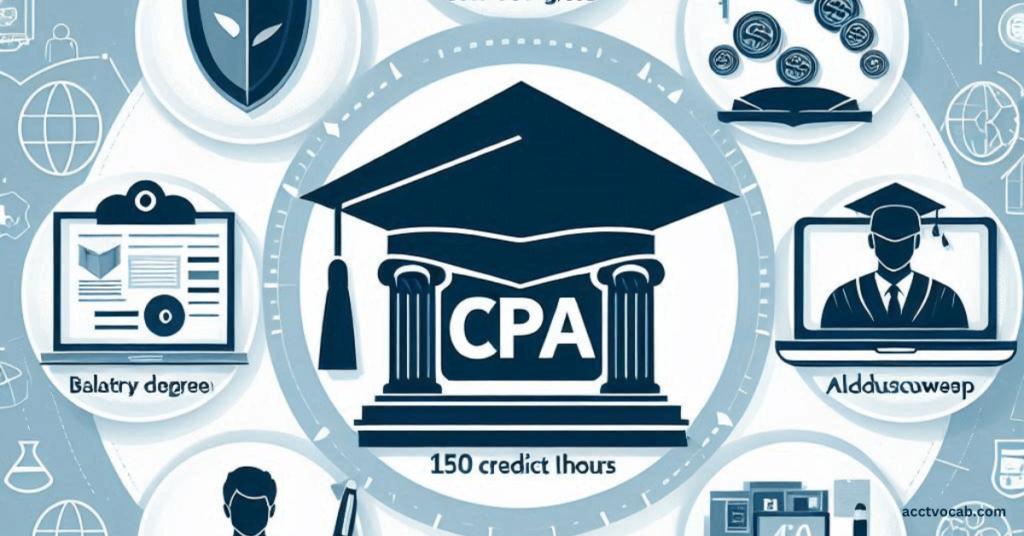How to Become a Certified Public Accountant (CPA)
Becoming a Certified Public Accountant (CPA) is a significant milestone for anyone pursuing a career in accounting. The CPA designation is highly respected and offers numerous career opportunities in finance, auditing, and consulting.
This article provides a comprehensive guide on how to become a CPA, including the educational requirements, exam process, and tips for success.
Introduction

The Certified Public Accountant (CPA) credential is one of the most recognized and prestigious certifications in the accounting profession. It opens doors to various career paths, from public accounting to corporate finance and government roles.
However, the journey to becoming a CPA requires dedication, rigorous study, and a deep understanding of accounting principles. In this guide, we’ll explore the steps to becoming a CPA, including the CPA exam, educational requirements, and practical tips to help you succeed.
1. Understanding the Role of a CPA
Before diving into the process of becoming a CPA, it’s essential to understand what a Certified Public Accountant does and why this certification is so valuable.
- Key Responsibilities: CPAs are responsible for preparing and analyzing financial statements, conducting audits, providing tax advice, and ensuring compliance with financial regulations.
- Career Opportunities: CPAs can work in public accounting firms, corporate finance departments, government agencies, and non-profit organizations. They may also specialize in areas like forensic accounting, tax planning, or management consulting.
- Importance of Certification: The CPA designation enhances your credibility, increases your earning potential, and provides a competitive edge in the job market.
Becoming a CPA is not just about passing an exam; it’s about building a foundation for a successful career in accounting.
2. Educational Requirements

The first step to becoming a CPA is meeting the educational requirements. These requirements vary by state but generally include:
- Bachelor’s Degree in Accounting: Most states require at least a bachelor’s degree with a concentration in accounting. The degree should cover core subjects such as financial accounting, auditing, taxation, and business law.
- 150 Credit Hours: Many states require candidates to complete 150 semester hours of education, which is typically more than a standard bachelor’s degree. This can be achieved by pursuing a master’s degree in accounting or taking additional coursework.
- Accredited Institutions: Ensure that your degree is from an accredited institution recognized by the state board of accountancy.
Meeting the educational requirements is a critical first step in your journey to becoming a CPA.
For state-specific CPA requirements, visit the AICPA website.
3. CPA Exam Overview
The CPA Exam is a rigorous test that assesses your knowledge and skills in various areas of accounting. The exam consists of four sections:
- Auditing and Attestation (AUD): Covers auditing procedures, generally accepted auditing standards, and ethics.
- Business Environment and Concepts (BEC): Includes business concepts, corporate governance, information technology, and economic concepts.
- Financial Accounting and Reporting (FAR): Focuses on financial accounting concepts, financial statements, and reporting standards.
- Regulation (REG): Covers federal taxation, business law, and ethics.
Each section of the exam is four hours long, and candidates must pass all four sections within 18 months.
4. CPA Exam Preparation Tips

Passing the CPA Exam requires thorough preparation and a strategic approach. Here are some tips to help you succeed:
- Create a Study Plan: Develop a study schedule that allows you to cover all exam content areas systematically. Allocate time for review and practice exams.
- Use Review Courses: Invest in a CPA review course that provides study materials, practice questions, and mock exams. Popular options include Becker, Wiley, and Roger CPA Review.
- Practice Time Management: During the exam, manage your time effectively to ensure you complete all questions. Practice under timed conditions to improve your pacing.
- Focus on Weak Areas: Identify and focus on your weak areas, but don’t neglect your strengths. Balanced preparation is key to passing the exam.
- Stay Consistent: Consistency is crucial in your study routine. Aim to study daily and take regular breaks to avoid burnout.
Proper preparation is essential for passing the CPA Exam and achieving your certification.
5. CPA Exam Registration Process
To register for the CPA Exam, you must follow a series of steps:
- Apply to Your State Board: Submit your application to your state board of accountancy. Each state has its own application process and fees.
- Obtain Authorization to Test (ATT): Once your application is approved, you will receive an ATT, allowing you to schedule your exam.
- Schedule Your Exam: Use the National Association of State Boards of Accountancy (NASBA) website to schedule your exam at a Prometric testing center.
- Pay Exam Fees: Exam fees vary by state and section. Ensure you pay all necessary fees to confirm your exam appointment.
Understanding the registration process will help you navigate the administrative requirements of the CPA Exam smoothly.
Learn more about the CPA Exam on the NASBA website.
6. CPA Experience Requirements

In addition to passing the CPA Exam, you must also meet the experience requirements to obtain your CPA license. These requirements typically include:
- Relevant Work Experience: Most states require 1-2 years of work experience in accounting, under the supervision of a licensed CPA. This experience should cover key areas like auditing, taxation, and financial reporting.
- Verification by a CPA: Your work experience must be verified by a licensed CPA who can attest to your competency and professionalism.
- Ethics Exam: Some states require candidates to pass an ethics exam in addition to the CPA Exam. This exam assesses your understanding of ethical standards and professional conduct.
Meeting the experience requirements is essential for obtaining your CPA license and practicing as a certified accountant.
7. CPA Licensure Process
Once you’ve passed the CPA Exam and fulfilled the experience requirements, the final step is to obtain your CPA license.
- Submit Your Application: Apply for your CPA license through your state board of accountancy. Include all necessary documentation, such as proof of education, exam scores, and work experience.
- Pay Licensing Fees: Licensing fees vary by state. Ensure you pay all required fees as part of your application.
- Continuing Professional Education (CPE): After obtaining your license, you must complete continuing education courses to maintain it. CPE requirements vary by state but typically include 40 hours of education annually.
Becoming a licensed CPA marks the culmination of your hard work and dedication, allowing you to practice as a certified public accountant.
8. Maintaining Your CPA License

Earning your CPA license is just the beginning; maintaining it requires ongoing commitment to professional development.
- CPE Requirements: Fulfill your state’s continuing professional education requirements to keep your license active. This often involves attending seminars, workshops, or online courses.
- Stay Informed: Keep up with changes in accounting standards, tax laws, and regulations. Staying informed ensures that you provide accurate and up-to-date services to your clients or employer.
- Networking: Join professional organizations like the American Institute of CPAs (AICPA) to network with other professionals and access valuable resources.
Maintaining your CPA license is essential for staying competitive and ensuring long-term success in your accounting career.
Conclusion
Becoming a Certified Public Accountant (CPA) is a rewarding journey that opens doors to diverse career opportunities in accounting and finance.
By meeting the educational requirements, passing the CPA Exam, gaining relevant work experience, and obtaining your license, you can achieve this prestigious certification.
The key to success lies in thorough preparation, persistence, and a commitment to ongoing professional development.
Whether you’re just starting your accounting career or looking to advance to the next level, the CPA designation can help you achieve your professional goals.
Key Takeaways:
- Understand the role and responsibilities of a CPA to appreciate the value of the certification.
- Meet the educational and experience requirements to qualify for the CPA Exam and licensure.
- Prepare thoroughly for the CPA Exam with a strategic study plan and review courses.
- Maintain your CPA license through continuing professional education and staying informed about industry developments.
You can also explore:
- Explore our guide to top accounting software for small businesses.
- Check out best practices for accurate bookkeeping.

